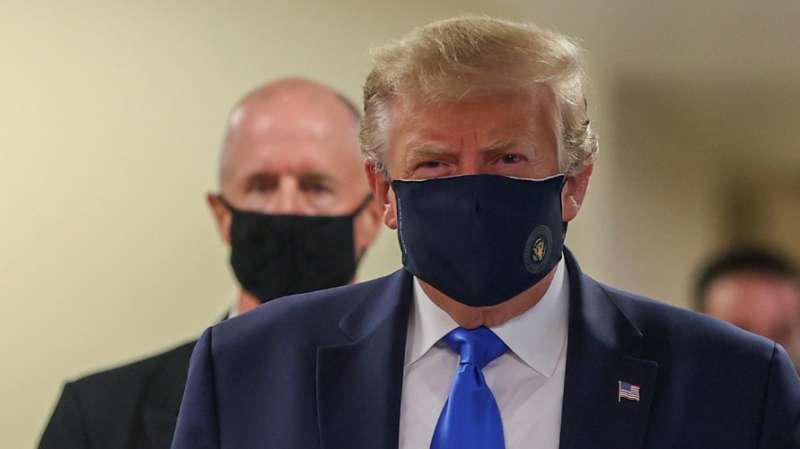Is Trump Getting Diagnosed With Covid19 Falls Under Netizens Claim – ‘October Surprise Conspiracy Theory’

On all sides of the political divide, Americans are circulating conspiracy theories about the COVID-19 diagnosis of President Donald Trump on social media. A whirlwind of speculation was set off by the president's announcement on Twitter early Friday that he and First Lady Melania Trump had tested positive for the disease. There was widespread speculation about the implications of the announcement on social media. In the President's statements, many began looking for clues and asserted, groundlessly, that the announcement was an elaborate ruse. But the announcement was not only perceived as part of a hidden conspiracy by parts of the conspiratorial right.
Even the netizens are suspecting Trump's announcement of tessting positive falling under 'October conspiracy theory'. There was widespread speculation on Twitter, even by progressives, that the shock announcement was really part of the President's plot to pull back an election victory as polls continue to show him trailing the Democratic candidate, Joe Biden. "Honestly, if a man lies too damn much, am I wrong to imagine another wolf's cry for an October surprise? That Trump is reporting a positive result, posing as asymptomatic, or reporting to be healed with bleach, then dismissing COVID as a Democratic hoax again? I 'm wrong, right?" David Simon, a screenwriter and president's outspoken critic, tweeted.
William Casey, the campaign manager for Ronald Reagan, coined the term October Surprise during the 1980 election. This refers to an unpredictable, impactful occurrence that takes place in the run-up to an election in October, which can have a huge impact on the way people vote. A planned political stunt to influence voters, a natural catastrophe or an international crisis might be The October Surprise, but they often occur weeks before a major election. Although the word was coined in 1980, October Surprises, as the following look back shows, have long been part of American electoral history.
The list of years where reportedly something suspicious has taken place and gave birth to conspiracy:
1880: Forged Letter
1884: "Rum, Romanism, and rebellion."
1968: Suspending Bombings
1972: "Peace is at Hand"
1980: October Surprise Conspiracy Theory
1992: Iran-Contra Investigation
2000: Bush Drunk-Driving Revelation
2004: Osama bin Laden Video
2012: Hurricane Sandy
2016: Trump Access Hollywood Tapes and Hilary Clinton's Emails
In response to criticism, Simon later said that he had been reflecting on how false allegations spread by Trump had fostered an atmosphere of mistrust. Other critics pointed to the president's history of spreading falsehoods as a reason to be wary of the announcement, like the Obama "birther" hoax or a visit he made to a medical centre in September. No evidence has emerged to prove that the diagnosis is incorrect or for political reasons has been fabricated.
A former CIA analyst, disinformation specialist, and vice president of analysis at the Alethea Group, Cindy Otis, said that rumours were circulating rapidly, but relying on credible information sources was critical. " This is one of the times where knowledge is and can travel rapidly, alter, and come from several different sources. A number of global theories of speculation and conspiracy have already been triggered by the President's optimistic diagnosis. "The danger is that they spread so quickly that people begin to interpret them as reality. Instead of posting the most sensational or conspiracies, people should concentrate on what we know from credible media outlets and sources, and stick to them."
As they spread, Mike Rothschild, who tracks conspiracy theories, cast doubt on the rumours. "The brain of the galaxy is that Trump fakes COVID in order to get out of the debates or distract him from the tax material. But his reputation depends on being Adonis, a street fighter of the bull god who outworks men half his age. He wouldn't pretend to be sick and frail. He'd cover it up if anything," he wrote. Theories of conspiracy have long been part of US political culture, with a 2014 University of Chicago study showing that 50 percent of Americans believe in at least one theory of conspiracy.
But Trump made the promotion of conspiracy theories central to his political persona, and during the coronavirus, he himself repeatedly employed disinformation. A study published Thursday by Stanford experts found that Trump is the single most significant generator of coronavirus misinformation in the world. In July, a study by Pew Research found a political difference in how likely someone was to believe in the conspiracy theory that the coronavirus was intentionally spread by mysterious influential powers, with 34% of Republicans reporting that, compared to 18% of Democrats, they assumed it was real.
The New York Times, however, claimed in 2017 that Trump's election had seen the number of conspiracy theories spread by progressives rise. Studies have found that faith in conspiracy theories becomes more widespread during times of crisis or disruption in society.
TAGGED :



